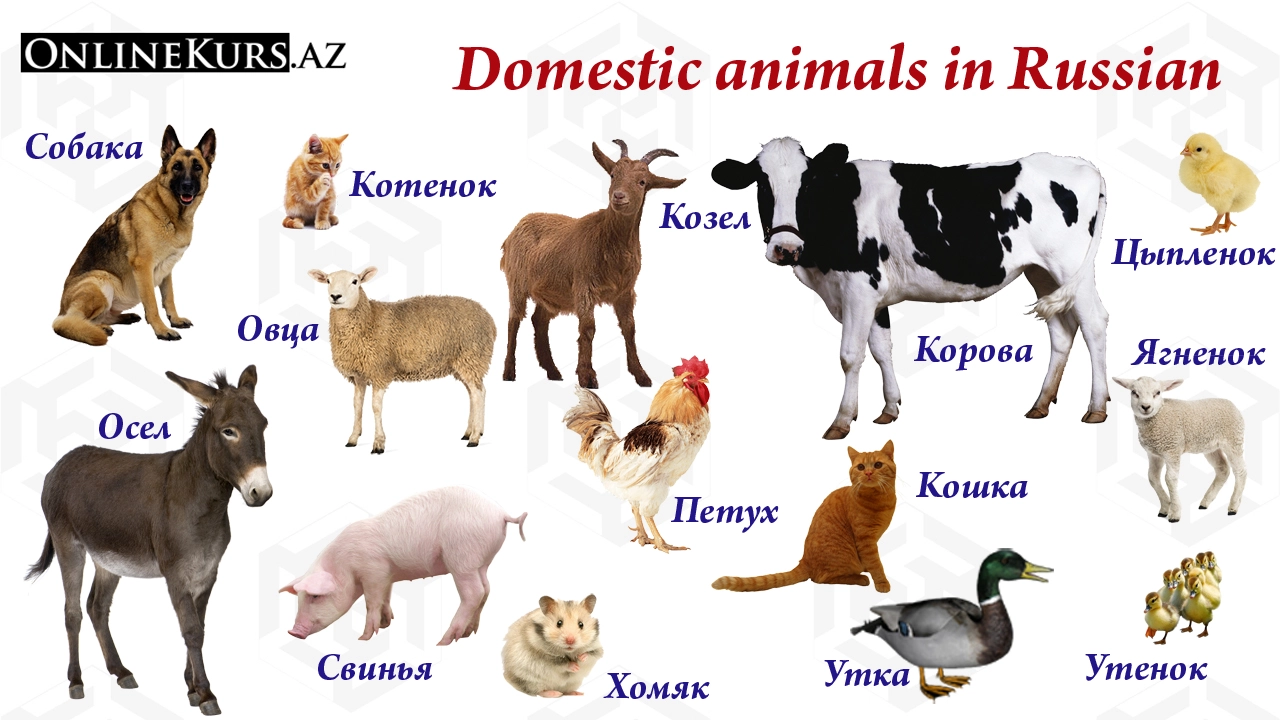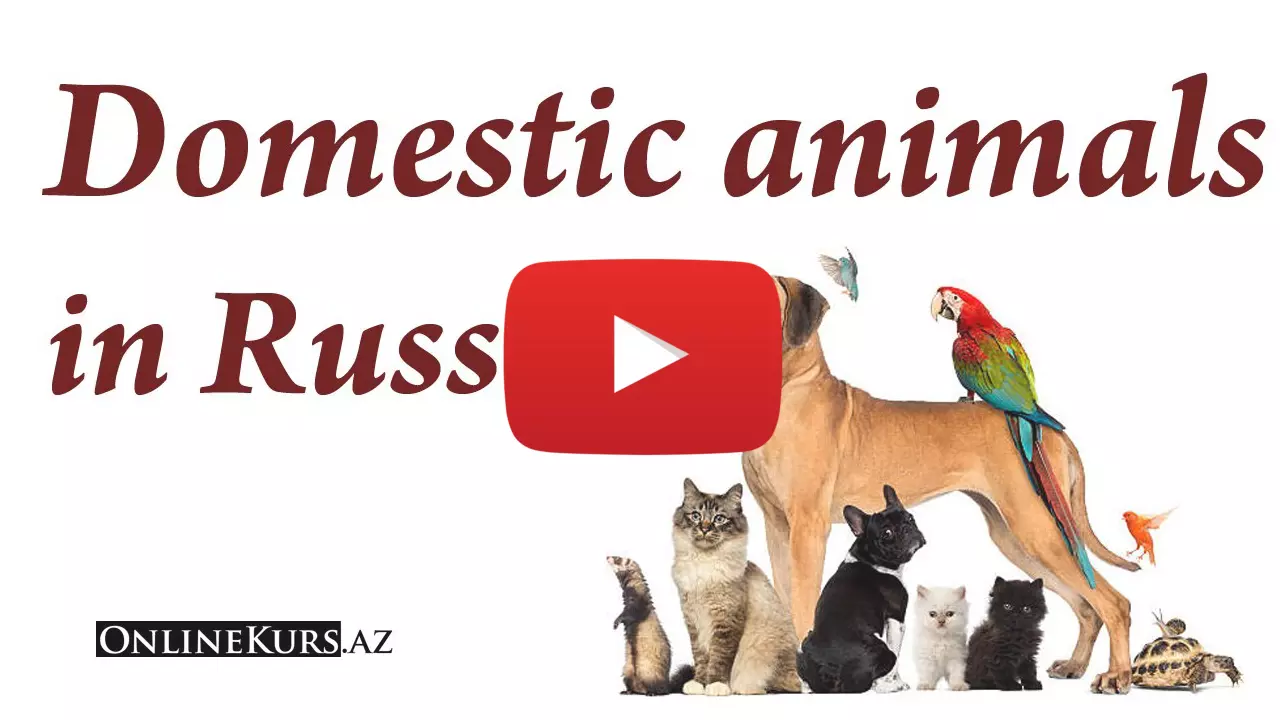Domestic animals in Russian
In this lesson we will learn new words on the topic: Domestic animals in Russian.
Names of domestic animals in Russian
Everyone knows how animals loving the Russians are. According to research, three-quarters of Russians (about 73%) have at least one four-legged friend at home. Research shows that Russian families have more cats than dogs. Domestic animals in Russian is one of the topics you can address when you don't have a common topic to talk to with a just met Russian or Russian-speaking person. It is unlikely that at least one Russian will ever find without a pet. Of course, if you know the names of domestic animals in Russian, then you can easily have a conversation with a Russian speaking foreigner. If you do not know the names of domestic animals in Russian, then today's lesson is dedicated to the topic of Domestic animals in Russian. You can also watch the lesson Wild Animals in Russian, so you need to know the names of domestic animals in Russian, as well as wild animals.
The names of domestic animals in Russian are eagerly studied by both children and adults. It is easier and more interesting for children to learn the names of domestic animals in Russian than complex topics. One of the first questions children ask in Russian classes is "What are the names of pets in Russian?" .
Russian language classes for children are conducted with the use of various games and other interesting tools, in addition to the topics that will certainly attract children. One of these tools is the study of verbs in Russian that express the sounds made by animals. In other words, if you explain to children how domestic animals make sounds in Russian, such lessons will be more interesting for them. For example, in the English language, a cat makes the sound "meow". In Russian, this verb is called "мяукать". In the English language, a hen "clucks", in Russian, it is called "Кудахтанье".
One of the best ways for children to learn Russian is to watch Russian cartoons. Animals in Russian are always an interesting topic for children. Children will easily remember the names of animals in Russian with the help of pictures, all kinds of cartoons, simple songs and poems. Animals are included in many children's tales, which are useful not only for children but also for adults learning Russian.
In addition to the topic of Domestic animals in Russian, it is recommended that you know the names of birds in Russian. Our site also has a topic that teaches the names of sea animals in Russian. All these topics will significantly increase your vocabulary on topics related to the animals in Russian.

Proverbs related to domestic animals in Russian
"Чья бы корова мычала, а твоя бы молчала." - Whose cow would moan and yours would be silent. (This proverb is said to a person who blames or judges another person who has the same shortcomings as himself. It means - "So you have this shortcoming - What are you talking about" )
"Козел на капустнике - плохой караульщик." - A goat in the cabbage garden - is a bad guard.
"Говорят, что кур доят." - They say that chickens are milked. (This proverb is used to express an ironic attitude towards false gossip when someone tells you an unconvincing rumor or a false version of a problem that you know the truth about. )
"И волки сыты, и овцы целы." - The wolves are fed and the sheep are safe. (They say this proverb about a mutually beneficial situation that arises as a result of the desire to satisfy people with different views and interests. )
"Не всякая собака кусает, которая лает." - Not every barking dog bites.
"Посади свинью за стол - она и ноги на стол." - Sit the pig at the table - and she will put her feet on the table. (They say this proverb about of an arrogant, ungrateful person who takes advantage of the kindness and help of others. )
"Свинья грязи найдёт." - The pig will find dirt.(This proverb is said about a person with a bad tendency which will always be affected by an unpleasant event. This proverb is used with condemnation when one sees how ugly a person is in society. At the same time, mothers use this proverb for their children returning home from a muddy walk.)
Spelling and pronunciation of domestic animals in Russian.
|
|
[ дам`ашн’ий’э жыв`отный’э ] | Domestic animals |
|
|
[ саб`ака ] | Dog |
|
|
[ щ’ин`ок ] | Puppy |
|
|
[ к`ошка ] | Cat |
|
|
[ кат’`энак ] | Kitten |
|
|
[ афца ] | Sheep |
|
|
[ бар`ан ] | Ram |
|
|
[ й’игн’`oнак ] | Lamb |
|
|
[ каз’`ол ] | Goat |
|
|
[ казл’`онак ] | Kid |
|
|
[ кр`упный’ раг`атый’ ск`от ] | Cattle |
|
|
[ кар`ова ] | Cow |
|
|
[ б`ык ] | Bull |
|
|
[ б`уй’вал ] | Buffalo |
|
|
[ т’ил’`эц ] | Calf |
|
|
[ л`ошат’ ] | Horse |
|
|
[ жыр’иб’`онак ] | Foal |
|
|
[ ас’`ол ] | Donkey |
|
|
[ в’ирбл’`ут ] | Camel |
|
|
[ св’ин’й’а ] | Pig |
|
|
[ парас’`онак ] | Piglet |
|
|
[ к`ур’ица ] | Hen |
|
|
[ п’ит`ух ] | Rooster |
|
|
[ цыпл’`oнак ] | Chick |
|
|
[ `утка ] | Duck |
|
|
[ ут’`онак ] | Duckling |
|
|
[ г`ус’ ] | Goose |
|
|
[ ин’д’`эй’ка ] | Turkey |
|
|
[ кр`ол’ик ] | Rabbit |
|
|
[ хам’`ак ] | Hamster |
|
|
[ пч’ила ] | Bee |
We believe that the education should be free and available to everybody. This is why some time ago, we made a decision to continue developing as a completely free network. But we need the support of our readers to continue creating new content, keep the development going and pay related expenses. If you like what we do and find it helpful, consider supporting us by making a donation to our accounts.
